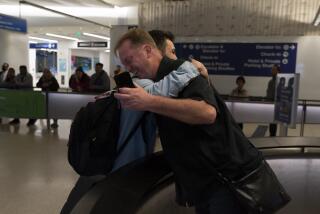The Law of Say-So
- Share via
The Pentagon’s announcement Tuesday that its officials have agreed that an American citizen held for 18 months may finally consult with a lawyer is at once a relief and scary.
For a year and a half, Yaser Esam Hamdi has been locked in a military brig at the mercy of Pentagon officials engaged in what they blandly term “intelligence collection.” Hamdi -- who, we repeat, is an American citizen -- is charged with no crime, yet his captors have denied him a lawyer and any contact with his family.
Hamdi, captured on the battlefield in Afghanistan, is one of two Americans the Pentagon has deep-sixed since the 9/11 attacks. The other is Jose Padilla, arrested at O’Hare International Airport in Chicago in May 2002 on suspicion of plotting to detonate a radioactive bomb. President Bush declared both men “enemy combatants” on his say-so alone, stripping them of every constitutional right.
Like so much else since 9/11, the administration seems to have cobbled together its enemy combatant policy on the fly, without thinking through the ominous consequences of its actions. That this outrageous and capricious policy has prompted a chorus of opprobrium from the right and the left only underscores how insupportable it is.
A challenge to Padilla’s detention is now before a New York appeals court. This year, a Virginia appeals court upheld Hamdi’s continued incarceration, and a petition on his behalf is before the U.S. Supreme Court. If judges uphold Bush’s unilateral decisions to indefinitely imprison Padilla and Hamdi -- as government lawyers urged the high court’s justices to do Wednesday -- this administration will have turned the Constitution on its head, making the fundamental rights all Americans thought were guaranteed instead the result of the president’s discretion.
The Pentagon’s concession Tuesday follows comments critical of the enemy combatant policy from two men who themselves played key roles in shaping Bush’s terror-fighting agenda.
In recent speeches and interviews, Viet Dinh and Michael Chertoff have expressed concern about the legality of Padilla’s and Hamdi’s detentions and the seat-of-the-pants nature of administration policymaking.
It bears asking why neither man spoke up when White House and Pentagon officials hatched the enemy combatant policy. Dinh, now a Georgetown University law professor, helped write the USA Patriot Act while head of the Justice Department’s Office of Legal Policy and fiercely defended Hamdi’s and Padilla’s detentions until he left government in May. Michael Chertoff headed the department’s criminal division until last summer and was rewarded with a federal judgeship.
Their comments are nonetheless welcome and further accentuate the wrongheadedness of the president’s approach and the peril it poses to every American.
More to Read
Sign up for Essential California
The most important California stories and recommendations in your inbox every morning.
You may occasionally receive promotional content from the Los Angeles Times.










